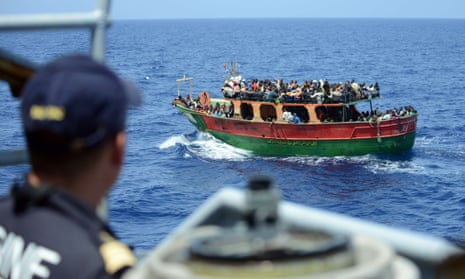More than 300 leading migration experts have denounced plans for military action against Libyan smugglers as reminiscent of the actions of countries that enabled the 18th century slave trade. Attempts to justify military intervention by comparisons with 18th century suppression of the slave trade were “entirely self-serving” and based on “a dangerous perversion of history”.
The academics’ provocative intervention follows the EU’s decision on Monday to begin naval operations that will target the complex web of Libyan smugglers who ferry hundreds of thousands of migrants towards Europe every year. In the runup to the decision, some EU politicians equated the planned mission with attempts to end the slave trade in the 18th century. The Italian prime minister, Matteo Renzi, described people-smugglers as “the slave traders of the 21st century” who “should be brought to justice”.
But 300 migration experts from universities including Oxford, Harvard, the London School of Economics, the School of Oriental and African Studies, Yale and Princeton have turned Renzi’s argument on its head, arguing that it is in fact the actions of the EU that most recall the mindset of 18th-century slave states. They claim that by attempting to destroy smuggling networks without providing alternative safe routes out of north Africa, Europe seeks to restrict the movement of Africans with actions that evoke those of slave traders in centuries past.
Writing on the website OpenDemocracy, the 300 say: “To attempt to crush [people-smuggling] with military force is not to take a noble stand against the evil of slavery, or even against ‘trafficking’. It is simply to continue a long tradition in which states, including slave states of the 18th and 19th century, use violence to prevent certain groups of human beings from moving freely.”
They argue that virtuous talk of ending a 21st-century slave trade is both an “entirely self-serving” attempt to mask Europe’s unwillingness to provide safe access to European shores, and a “patently false” interpretation of the history of the slave trade.
The article states: “As scholarship on the history of slavery makes painfully clear, what is happening in the Mediterranean today does not even remotely resemble the transatlantic slave trade. Enslaved Africans did not want to move … Today, those embarking on the journey to Europe want to move. If they were free to do so, they would be taking advantage of the flights that budget airlines operate between North Africa and Europe at a tiny fraction of the cost of the extraordinarily dangerous sea passage. And it is not ‘slavers’ or ‘traffickers’ who are preventing them from accessing this safe route.”
The academics join a growing list of critics who have spoken out against military action. Separately, the Italian coastguards who coordinate Europe’s emergency search-and-rescue operations in the southern Mediterranean told the Guardian on Monday that the smuggling crackdown would not end such a huge wave of migration. Both of Libya’s rival governments have said EU incursions into Libyan waters would be an infringement of Libyan sovereignty.
On-the-ground reporting of Libyan smuggling networks suggests that pre-emptive military action would also struggle for practical reasons. According to smugglers and fishermen, smuggling vessels are often simply fishing boats bought on a one-time-use basis in the days prior to a smuggling mission, and kept in civilian harbours until the evening of their departure.
To those not involved in the transaction, the boat’s new purpose would only be hinted at once it left port in the early evening, and dropped anchor some distance from the shore to await the arrival of its passengers by dinghy. This gives European navies only a brief window to identify smuggling vessels, and to destroy them without endangering innocent life.

Comments (…)
Sign in or create your Guardian account to join the discussion